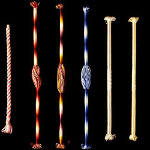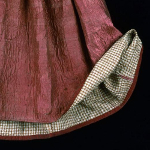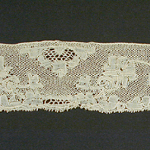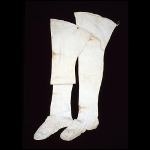Artifact: Shoes

Materials: Damask, Satin, Wool etc.
Dimensions:
Date: 18th Century
Origin: England or America
Collection: Image Courtesy of The Colonial Williamsburg Foundation
License: All rights reserved
Ledger Entry: Woman's Best Shoes

Department: Footwear
Customer: Vorlinda Wade
Ledger Page: 126
Imported From: Shoes were produced both ready to wear and to order in the colonies, but higher quality shoes were frequently imported from London.
Product Description
Shoes in the eighteenth century, as today, varied greatly in style, function, and material. While women's shoes for the less wealthy would have been made of more durable leather, upper-class women's shoes were made in silks, satins, and callamancos that while beautiful, would not withstand the elements or much rigorous activity. These were frequently fastened with lavish buckles which were also status symbols. Shoe sizing was not standardized, so shoe measurements were imprecise. The most wealthy customer could send sketches of their feet to special order from England, but even this method was not a guarantee of fit. Purchasing ready-made and imported shoes allowed the prestige and craftsmanship of London shoemakers, but was likely not a comfortable option. A further distinction is made in the accounts between single and double channel shoes which had more stitching and were therefore of higher quality.
Citation: Linda Baumgarten. Eighteenth-Century Clothing at Williamsburg. (Williamsburg, Va: Colonial Williamsburg Foundation, 1986).; Giorgio Riello and Peter McNeil. “Walking the Streets of London and Paris: Shoes in the Enlightenment” in Shoes : a History from Sandals to Sneakers. Edited by Peter McNeil and Giorgio Riello. (Oxford ; New York :Berg, 2006).
Historical Price: 3 shillings, 6pence per pair; Modern USD: $39.2
Product Variations
The databases record Forty-seven pairs of shoes and twenty-seven pairs of pumps. They come in mens, womens, boys, and youth sizes. They are qualified by terms such as best, strong, and No. 1. The pumps are identified as either single or double channel. The only materials listed are silk and callamanco. Their prices range from one shilling for a pair of mens shoes to thirty-seven shillings and nine pence for a pair of womens pumps.






